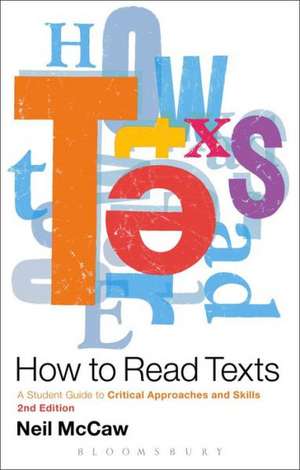How to Read Texts: A Student Guide to Critical Approaches and Skills
Autor Dr Neil McCawen Limba Engleză Paperback – 25 sep 2013
Preț: 163.71 lei
Preț vechi: 190.74 lei
-14% Nou
Puncte Express: 246
Preț estimativ în valută:
31.34€ • 32.92$ • 26.33£
31.34€ • 32.92$ • 26.33£
Carte disponibilă
Livrare economică 18 februarie-04 martie
Preluare comenzi: 021 569.72.76
Specificații
ISBN-13: 9781441190666
ISBN-10: 144119066X
Pagini: 192
Dimensiuni: 138 x 216 x 8 mm
Greutate: 0.23 kg
Ediția:Revised
Editura: Bloomsbury Publishing
Colecția Bloomsbury Academic
Locul publicării:London, United Kingdom
ISBN-10: 144119066X
Pagini: 192
Dimensiuni: 138 x 216 x 8 mm
Greutate: 0.23 kg
Ediția:Revised
Editura: Bloomsbury Publishing
Colecția Bloomsbury Academic
Locul publicării:London, United Kingdom
Caracteristici
Updated
second
edition
helps
students
analyse
a
wide-range
of
multi-media
texts
beyond
the
literary.
Notă biografică
Neil
McCawis
Senior
Lecturer
in
English
and
Creative
Writing
at
the
University
of
Winchester,
UK.
Cuprins
1.
What
is
a
Text
and
What
Do
We
Do
With
It?Thinking
about
texts
Texts
in
the
digital
age
Terminology
and
differences
Levels
of
reading
Theories
of
reading2.
Creative
ReadingWhat
is
criticism?
What
is
creativity?
Being
critical
and
creative
Reading
as
a
critic
vs.
reading
as
a
writer
Creativity
and/as
research3.
Close
ReadingThe
history
of
close
readingThe
benefits
of
close
readingThe
problems
with
close
reading
New
ways
of
applying
close-reading-skillsResearching
texts
close-up4.
Biography
and
AuthorshipThe
role
of
the
authorThe
significance
of
biographyLife-writingThe
limitations
of
author-centred
approachesResearching
authors5.
History
and
ContextsHow
history
fits
in
Other
types
of
contextA
critique
of
historical
readingThe
strengths
of
historical
readingResearching
contexts6.
Reading
TheoreticallyWhat
is
theory?The
origins
of
theoryThe
impact
of
theory
The
achievements
of
theory
After
theory
Conclusion:
Reading
Now!
Notes
Bibliography
Index
Recenzii
How
to
Read
Textsis
filled
with
a
passion
for
reading
and
for
authorship.
Lively
and
approachable,
this
is
a
great
book
for
anyone
interested
in
how
we
approach
the
texts
we
encounter
in
our
lives.
Neil McCaw'sHow to Read Texts: A Student Guide to Critical Approaches and Skillsoffers an invaluable and expansive introduction to the often vexing worlds of avant-garde critical theory and literary interpretation. Yet even more significantly, McCaw challenges us to discover our own critical voices, to seek out brave new textual frontiers of our own making, and to think creatively about the nature and direction of our reading experiences. Suitable for academic and general readers alike,How to Read Textsaffords us with the attendant tools and historical background for unlocking and appreciating the rich texts that mark our lives.
How to Read Textswill encourage both students - and, as importantly, their teachers - to re-think the very basics of reading and analysing texts.
With a solid set of appendixes and an index,How to Read Textsis enthusiastically recommended for those facing a tough pile of books in their future.
How to Read Texts: A Student Guide to Critical Approaches and Skillsoffers high school and college-level students a fine survey of critical theory paired with exercises and checklists to help students in their own readings of primary and secondary texts. Students learn how to gain confidence in their skills and learn the methods of recognizing and challenging assumptions in this fine survey of critical thinking skills.
Neil McCaw'sHow to Read Texts: A Student Guide to Critical Approaches and Skillsoffers an invaluable and expansive introduction to the often vexing worlds of avant-garde critical theory and literary interpretation. Yet even more significantly, McCaw challenges us to discover our own critical voices, to seek out brave new textual frontiers of our own making, and to think creatively about the nature and direction of our reading experiences. Suitable for academic and general readers alike,How to Read Textsaffords us with the attendant tools and historical background for unlocking and appreciating the rich texts that mark our lives.
How to Read Textswill encourage both students - and, as importantly, their teachers - to re-think the very basics of reading and analysing texts.
With a solid set of appendixes and an index,How to Read Textsis enthusiastically recommended for those facing a tough pile of books in their future.
How to Read Texts: A Student Guide to Critical Approaches and Skillsoffers high school and college-level students a fine survey of critical theory paired with exercises and checklists to help students in their own readings of primary and secondary texts. Students learn how to gain confidence in their skills and learn the methods of recognizing and challenging assumptions in this fine survey of critical thinking skills.
